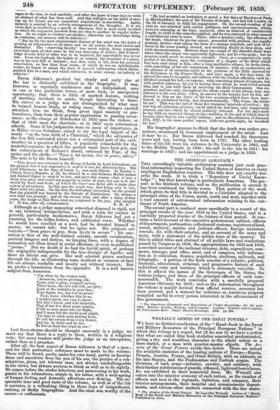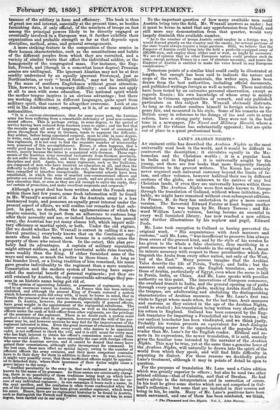WRAXALL'S ARMIES OF THE GREAT POWERS.*
WE have no distinct recollection of the "Hand-Book to the Naval and Military Resources of the Principal European Nations" to which this volume is a sequel, but (if we saw it) we have auction that what are called blue book statistics somewhat predominated, giving a dry and resultless character to the whole unless to a mere statist, or a man with quarter-master objects. The Ar- mies of the Great Powers avoids this defect. There are indeed the available statistics of the leading nations of Europe—Russia, Prussia Austria, France, and Great Britain, with an addenda on the late Sepoys, and the Piedmontese and Turkish armies. The divisions of each army—infantry, cavalry, and artillery, with their further subdivisions of guards, riflemen, light and heavy horse &c. are exhibited in their numercial force. Mr. Wraxall also enters into the minister economy of each nation, as the number of officers and men in the regiment, battalion, and company, their interior arrangements, their hospital and commissiarate depart-. meats, and various other matters connected with the due main- • • The Armies of the Great Powers. By Lascelles Wraxall. Author of " Hand- Book of the Naval and Military Resources of the Principal European Nations." Published by Allen.
tenance of the soldiery in force and efficiency. The book is thus of great use and interest, especially at the present time, as besides furnishing data, if only official, of the numbers of troops on foot among the principal powers likely to be directly engaged or eventually involved in a European war, it further exhibits their organization and probable strength so far as that depends upon discipline, method, arms, and general arrangements.
A more striking feature is the composition of these armies in their human characteristics, such as the constitutions and habits of the different peoples from which they are recruited, and a 'variety of similar traits that effect the individual soldier, or the homogeneity of the congregated mass. For instance, the Eng- lish, French, and (though in a somewhat lesser degree) Prussian armies are unilinguaL The ignorant Alsatian may not be at first readily understood by an equally ignorant Provençal, just as Northumbrian, or very- "broad Scotch," may not be intelligible to the mass of southern Englishmen without great attention. This, however, is but a temporary difficulty ; and does not apply at all to men with some education. The national spirit winoh the mother tongue inspires is an obvious advantage ; but there are workinf; difficulties in different languages, quite apart from military spirit, that cannot be altogether overcome. Look at one evil 111 the Austrian army, composed, as it is, of so many distinct nationalities.
"It is a curious circumstance, that for some years past, the Austrian army has been suffering from a remarkable deficiency of good non-commis- sioned officers. This is perhaps owing, in some degree, to the period of service having been reduced from fourteen years to eight ; and the fact that the recruits speak all sorts of languages, while the word of command is given throughout the army in German, tends to augment the difficulty. Any soldier, before being appointed corporal, must be able in some degree, to write, read, and speak German, and in the Hungarian, Polish, and Ita- lian regiments, it is not easy to find the requisite number of trustworthy men possessed of this accomplishment. Hence, it often happens, that a really good man has to be passed over in favour of a man of doubtful cha- racter, merely because the latter is acquainted with German. Those regi- ments of the Austrian army recruited exclusively from German provinces, do not suffer from this defect, and hence the general superiority of their discipline and drill. Again, too, many regiments, such as the Galliaian, are composed of men who have received no education at all, and then the difficulty is doubly felt. So glaring is the evil, that the War Ministry has been compelled to interfere energetically. Regimental schools have been established, in which the sons of married non-commissioned officers and privates are received from their earliest youth, and are given such a mili- tary education that, so soon as they are old enough to enter the ranks, they are certain of promotion, and make excellent sergeants and corporals."
Although a great deal has been written about the French army within these last few years, some fresh information will be found in Mr. Wraxall's account of it. As the Austrain army is a less hackneyed topic, and possesses an equally great interest under the present aspect of affairs, we will confine our remarks to that sub- ject. In part, no doubt, from the agglomerations of which the empire consists, but in part from an adherence to customs long after their necessity and use, or indeed harmlessness, has passed away, the Austrian has yet many abuses left, which impair mili- tary efficiency or martial spirit, or both. Under the old regime,
ger we doubt whether Mr. Wraxall is correct in calling it a me- . eeval practice ) everybody knows that on the Continent regi ments often took the name and became in a certain sense the property of those who raised them. In the outset, this plan pro- bably, had its advantages. A captain of military reputation might attract soldiers, and a great territorial noble raise recruits, more readily than the King. If either furnished some of the ways and means, so much the better in those times. As long as the founder lived, or a living tradition of him remained, his name gave greater individuality to the regiment than a mere number. Conscription and the modern system of borrowing have super- seded the material benefit of personal regiments ; yet they are still retained by Austria, the only conceivable advantage they pos- sess in an historic name being got rid of. "The system of appointing Inhaber, or possessors of regiments, is car- ried to an enormous extent in Austria. In France this has been entirely abolished, and although the present King of Prussia restored a system which Scharnhorst quite did away with, it must be borne in mind, that in Prussia the possessor does not exercise the slightest influence over the regi- ment. In Austria, however, the possessors, especially if general officers, have great weight in the appointment of the regimental subaltern,. The appointment of cadets and their promotion, as well as the transference of officers under the rank of field-officer from other regiments, are the privilege of the possessor of the regiment. There is no doubt such a system must produce a deleterious effect in regiments, however good the will of the pos- sessor may be, and however anxious he may feel for the improvement of the regiment intrusted to him. Even the great increase of education demanded, under recent regulations, from every youth who desires to be appointed cadet, is not sufficient to cheek the evil, and it is still usual for every man who has high interest to obtain his officer's commission more easily than fairness would allow. This is more especially the case with foreign officers who enter the Austrian service, and it cannot be denied that many have gained their commissions, although quite incompetent for command. In the best case, these men effect no special injury, owing to the number of efficient officers the army contains, and their more competent comrades have to do their duty for them in addition to their own. In war, however, it might very possibly occur' that these inefficient officers might be appoint- ed to detached duty, where their ignorance of their duties might cause a
grave injury to the army, • Another peculiarity in the army is, that each regiment is exclusively known by the name of its possessor. As these names are continually chang- ing, there is no possibility of those traditions being kept up which have such influence in other armies. It is quite impossible to follow out the ca- reer of any individual regiment ; in one campaign it bears such a name, in
the next another, and the confusion is often worse confounded when the son of the deceased possessor has been given another regiment, which bears his name. Hence, there are no regimental histories to be found in Austria, such as distinguish the French and Russian armies, or even as has, in some degree, been carried out in our army."
To the important question of how many available men could Austria bring into the field, Mr. Wraxall answers as under ; but it must be borne in mind that any apprehension from Poland, and still more any demonstration from that quarter, would very largely diminish this available number.
As to the number of' troops Austria could employ in a foreign war, it would depend greatly on the country and the enemy, for several portions of the state would always require a large garrison. Still, we believe that the Emperor of Austria could being into the field a perfectly-equipped array of 400,000 men, and employ them either east or west, as might be necessary. We are of opinion that no other European nation could produce such an army, except perhaps France in a case of absolute necessity, and hence the Emperor of Austria is entitled to make his voice heard in any European complication."
Numerous points of a similar kind could easily be illustrated at length ; but enough has been said to indicate the nature and scope of the work. The materials, the writer says, have been drawn from the best authorities, including official documents, and published writings foreign as well as native. These materials have been tested by an extensive personal observation, except as regards Russia ; his own knowledge of whose army is mainly limited to Crimean opportunities of remark, and any published particulars on this subject Mr. Wraxall obviously distrusts. As long as the author confines himself to foreign armies he ap- pears fair, and measured in his style. Some of his remarks on the British army in reference to the doings of ins and outs in army reform, have a strong party taint. They were not in the best tone in a newspaper, The Naval and Military Herald, where a portion of the volume has substantially, appeared ; but are quite out of place in a quasi professional book.



































 Previous page
Previous page